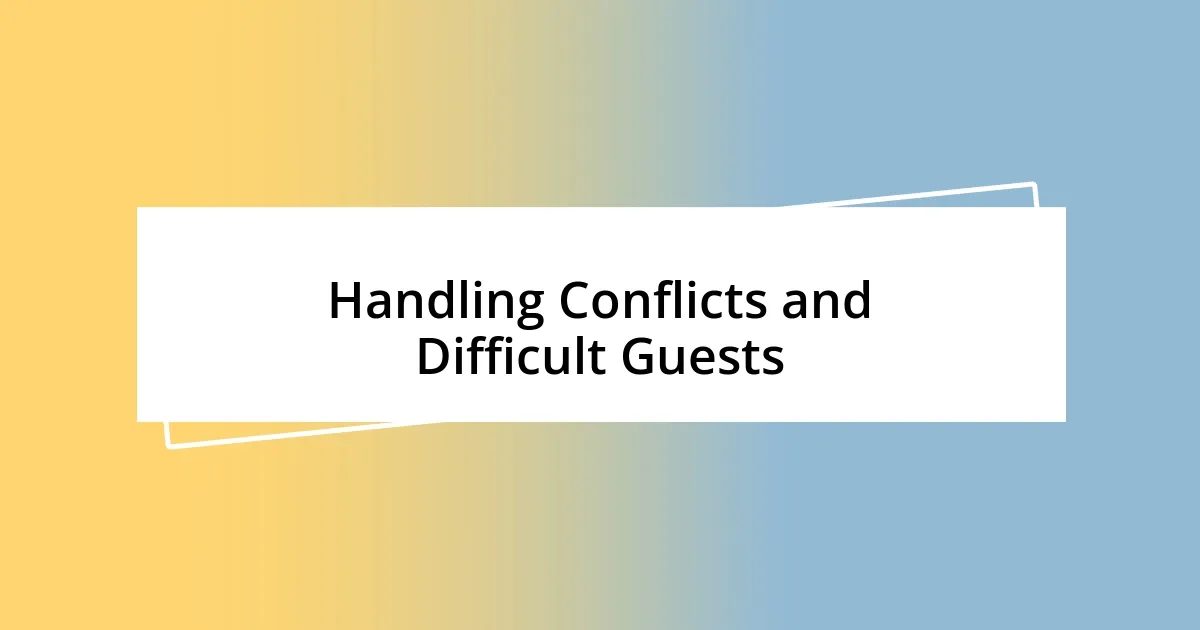Key takeaways:
- Creating a guest list can provoke stress due to relationships, obligations, and family dynamics, making it important to focus on meaningful connections.
- Establishing priorities, categorizing guests, and setting limits can simplify the selection process and maintain an intimate atmosphere.
- Addressing potential conflicts early, setting guidelines, and providing alternative activities can help manage difficult guests during events.
- Using technology like guest list apps and spreadsheets, along with effective communication, can streamline organization and enhance the overall event experience.

Understanding Guest List Stress
Creating a guest list can be surprisingly stressful, can’t it? I remember when I was planning my birthday party and felt the pressure to include everyone I knew. The fear of leaving someone out or not meeting expectations can be overwhelming. Each name seemed to carry a weight, a reminder of relationships, past experiences, and social dynamics.
I once had a friend who struggled with this stress while planning her wedding. She found herself torn between inviting relatives she hadn’t spoken to in years and her closest friends who had been there through thick and thin. It made me realize that guest list decisions often reflect our values and priorities at that moment, and it’s hard to know what truly matters when emotions are high.
Also, let’s not forget the added layer of family dynamics. I’ve seen guests unintentionally escalate tensions, like when my cousin invited someone who had a contentious history with another family member. These complexities can turn a seemingly simple list into a minefield of emotions. Have you experienced something similar? Understanding the roots of guest list stress can help us navigate these tricky waters and focus on what truly matters: the joy of gathering loved ones.

Tips to Simplify Guest Selection
Choosing the right guests can feel daunting, but I’ve found that starting with a clear list of priorities helps immensely. I often ask myself, “Who are the people I truly want to share this moment with?” This method not only clarifies my intentions but also makes the process less about obligations and more about meaningful connections.
It’s helpful to categorize guests into groups—like close friends, family, and acquaintances. This strategy reminds me of the time I organized a small gathering. By focusing on my inner circle first, I created a cozy atmosphere that really allowed everyone to connect without feeling like a crowded event. It’s about quality over quantity.
Another useful tip is to set limits early on. I learned the hard way during a past event; I had aimed for a large group, but when the invites spread too wide, the intimate vibe I desired slipped away. By defining a guest count from the start, I maintained control over the atmosphere and ensured I could genuinely enjoy the company of those I invited.
| Tip | Description |
|---|---|
| Establish Priorities | Identify who matters most to you for a meaningful gathering. |
| Categorize Guests | Group your guests to aid in focusing your selections. |
| Set Guest Limits | Determine a maximum number to maintain an intimate atmosphere. |

Handling Conflicts and Difficult Guests
Handling conflicts with difficult guests can be one of the most challenging aspects of planning any event. I vividly recall a gathering where two guests clashed over a past disagreement that had nothing to do with me but suddenly became the focal point of the evening. I learned the importance of intervening discreetly, gently steering the conversation elsewhere to defuse tension. Sometimes, all it takes is a bit of tact and attentiveness to ensure everyone feels comfortable and included.
When dealing with difficult guests, here are a few strategies I’ve found helpful:
- Address Issues Early: If you sense a potential conflict brewing, speak to guests privately to resolve any misunderstandings.
- Set Clear Guidelines: Establishing what behaviors are acceptable can create a positive atmosphere, making expectations clear from the outset.
- Provide Alternative Activities: Engaging guests in group games or conversations can redirect focus away from potential conflicts.
- Stay Calm: Maintaining your composure in stressful situations can have a calming effect on those around you.
- Know When to Separate: Sometimes, it may be best to create some distance between conflicting guests for the overall harmony of the event.
Through these experiences, I’ve come to see that conflicts are not only hurdles but opportunities for learning about how to manage personal dynamics effectively. It’s a delicate dance, but with the right mindset, I’ve often turned potential disasters into unforgettable moments of connection.

Tools for Managing Guest Lists
When managing guest lists, technology can be a lifesaver. I remember the first time I used a guest list app for an event; it changed how I organized everything. With features like RSVP tracking and categorization, I felt a sense of control that I hadn’t experienced before. Have you ever found yourself sifting through countless emails just to confirm who’s coming to your event? Trust me, a good app simplifies that chaos, ensuring you stay focused on the celebration rather than the logistics.
Another great tool I love is a simple spreadsheet. Instead of relying solely on an app, I created a comprehensive spreadsheet that included key information like dietary restrictions and plus-ones. It’s surprisingly satisfying to see everything in one place. Plus, it helps me quickly assess if I need to make any last-minute adjustments. Have you ever had to figure out seating arrangements on the fly? Having all that data handy makes it a breeze, and it gave me the peace of mind to enjoy my events more fully.
Lastly, I can’t stress enough the importance of communication. I often set up a group chat or use social media to interact with my guests leading up to the event. It creates excitement and also helps manage expectations. I once invited a few friends to a gathering, and through our chat, I discovered overlapping plans. We were able to adjust the date, ensuring that everyone could be part of the fun. It’s moments like these that remind me of the joy in connection, turning a stressful guest list into an opportunity for deeper ties.














